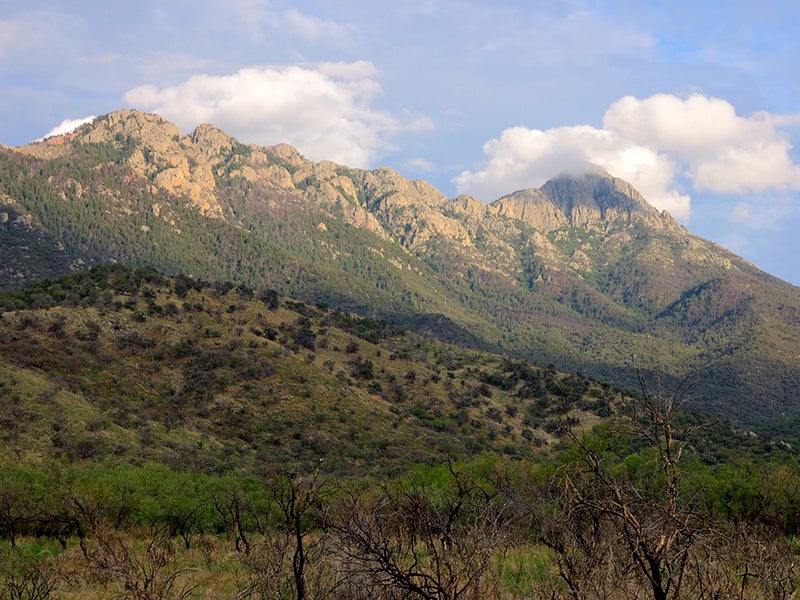Tribes Challenge Final Permit For Toxic Open‐Pit Copper Mine On Sacred Lands
Mine in Arizona would desecrate burial sites and historic places, and destroy streams and groundwater resources
Contact
The Tohono O’odham Nation, Pascua Yaqui Tribe, and Hopi Tribe filed a complaint in U.S. District Court today challenging the U.S. Army Corps of Engineers’ decision to issue Rosemont Copper Company a permit to commence construction of a massive open-pit copper mine on the eastern flank of the Santa Rita Mountains in the Cienega Creek watershed. The Tribes are represented by Earthjustice, an environmental legal organization.
The creek and its tributaries have supported the tribes and their ancestors since time immemorial. Cienega Creek and its upstream tributaries, including Davidson Canyon, Barrel Canyon and Empire Gulch, contain some of the highest quality streams and wetland ecosystems in Arizona.
Rosemont plans to excavate a mile-wide by half-mile deep open pit mine in Barrel Canyon, discharging an estimated 1.9 billion tons of waste rock onto adjacent public lands. These activities would destroy 18 miles of streams that are protected by the Clean Water Act. None of these activities can occur without a permit from the Corps.
Male jaguar photographed by motion-detection wildlife cameras in the Santa Rita Mountains on August 31, 2015 as part of a Citizen Science jaguar monitoring project conducted by the University of Arizona, in coordination with U.S. Fish and Wildlife Service. This is the same jaguar that has been repeatedly photographed in the Santa Rita Mountains.
Photo Courtesy of UA/USFWS
“One of the primary reasons that the Pascua Yaqui Tribe opposes this mine is its impacts upon our water.” said Chairman Robert Valencia of the Pascua Yaqui Tribe. “The Pascua Yaqui Tribe knows that water is precious in the desert and precious to all the plants and animals that depend upon it. The few short-term jobs that this mine will create are not worth the destruction that we will have to live with forever.”
For over eight years, the U.S. Environmental Protection Agency, Pima County, and an overwhelming majority of the public joined the Tribes in opposing the permit for the mine, citing unacceptable adverse impacts on the ecosystems and severe and irreparable harm to tribal cultural resources.
“As a result of the Hopi people’s long history in the Southwest, we understand the importance of water,” said Vice Chairman Clark W. Tenakhongva of the Hopi Tribe. “Culturally any body of water is something precious and sacred and it would be culturally irresponsible for us to support any activity that would jeopardize a resource so essential to all living beings and something on which we all depend.”
Due to the unacceptable adverse impacts of the mine on aquatic and cultural resources, the Corps’ Los Angeles District Office refused to grant a permit for the mine in 2016. The Corps’ South Pacific Division, however, reversed course and granted Rosemont the permit earlier last month.
“The Corps’ South Pacific Division has provided no reasoned basis for reversing course and abruptly granting Rosemont a 404 permit,” said Earthjustice attorney Stu Gillespie. “EPA and the Corps’ District Office concluded that the proposed permit would violate the Clean Water Act and cause unacceptable harm to the public interest. The Corps cannot sweep these concerns under the rug in its rush to permit this devastating project.”
Rosemont plans to begin excavating and removing ancestral villages and burial sites in the near future. Its plans include the use of backhoe trenches, mechanical stripping, and shovel stripping to remove all cultural artifacts from the mine site, including human remains, funerary objects, sacred items, and objects of cultural patrimony.
“The proposed mine would forever destroy our ancestor’s burial sites, and structures they inhabited in the Santa Rita Mountains,” said Austin Nunez, chairman of the St. Xavier District of the Tohono O’odham Nation. “The mine would also erode evidence of our ancestors’ prior occupation in that area and destroy the plant life and watershed in the area. The long term environmental consequences that will come from the Rosemont Mine project development far outweigh the short-term financial gains sought by the company and its shareholders.”
The complaint states that in issuing the permit, the Corps violated the Clean Water Act, the National Environmental Policy Act, and the Administrative Procedure Act.
The Tribes are represented by Stuart C. Gillespie and Caitlin Miller, attorneys for Earthjustice.
About the Pascua Yaqui Tribe: The Pascua Yaqui Tribe is a federally recognized tribe of approximately 22,000 enrolled members with a reservation southwest of Tucson, Arizona.
About the Hopi Tribe: The Hopi Tribe is a federally recognized Indian tribe located in northeastern Arizona with approximately 14,475 members. The Hopi reservation occupies part of Coconino and Navajo counties, encompasses more than 1.5 million acres, and comprises twelve villages situated on three mesas.
About the Tohono O’odham Nation: The Tohono O’odham Nation is a federally recognized tribe of approximately 35,000 enrolled members, with more than 2.8 million acres of reservation lands in Southern and Central Arizona.
“Ours is the Land” is produced by the Tohono O’odham Nation from Rogelio Garcia on Vimeo.

Additional Resources
About Earthjustice
Earthjustice is the premier nonprofit environmental law organization. We wield the power of law and the strength of partnership to protect people's health, to preserve magnificent places and wildlife, to advance clean energy, and to combat climate change. We are here because the earth needs a good lawyer.